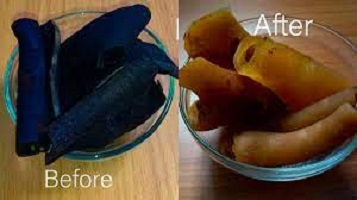Mouthwatering Abacha Recipe (African Salad)
Mouthwatering Abacha Recipe (African Salad)
Prepared mainly by the Igbo people, this irresistible dish is a special delicacy that will always make you salivate once you catch the aroma.

Whether you are new to Nigerian cuisine or already an Abacha lover, this recipe will guide you step-by-step on how to prepare a fully loaded, mouthwatering Abacha (African Salad) that will leave your taste buds asking for more.
So, grab your salad spoons, sit back, and let’s dive into this recipe.
Abacha Recipe: What is Abacha (African Salad)?
Abacha, also known as African Salad, is a traditional Igbo dish made from dried shredded cassava.
It is often served as an appetizer, side dish, or even a full meal, depending on how it’s prepared.
In Enugu and Anambra states of Nigeria, Abacha is a staple dish during ceremonies, traditional gatherings, and festive occasions.
The preparation style is quite similar to other local dishes such as ugba, kpomo sauce, and nkwobi, but Abacha stands out for its colorful presentation, rich flavors, and use of fresh vegetables like utazi leaves or garden egg leaves.
Apart from its delicious taste, Abacha is also considered a symbol of hospitality. No Igbo event feels complete without a bowl of African Salad being passed around.
Why You Will Love This Mouthwatering Abacha Recipe
- Unique taste: The combination of palm oil, ugba, smoked fish, and fresh vegetables gives Abacha its signature savory and slightly tangy flavor.
- Highly versatile: It can be eaten as a snack, light lunch, or full meal.
- Nutritious: Abacha contains cassava, protein from smoked fish and cow skin, and vitamins from fresh vegetables.
- Crowd-pleaser: A must-have dish for entertaining guests during weddings, birthdays, or festive holidays.
Fun fact: During my pregnancies, I craved Abacha so much that it made up nearly 90% of my diet! No day passed without eating this African Salad until I gave birth. That’s how addictive it can be.
Abacha Recipe: Ingredients for Abacha (African Salad)
Here’s a detailed list of ingredients you’ll need for this African Salad recipe:
- 3 handfuls of Abacha (dried, shredded cassava)
- 2 medium-sized dried smoked fish
- 1 sizeable cow skin (kpomo)
- 3 cooking spoons of palm oil
- 1 medium onion (chopped)
- 2 seasoning cubes (stock cubes)
- 3 ehuru seeds (African nutmeg)
- 2 dansa seeds
- 1 control onion (used as a spice)
- ½ teaspoon ogiri (fermented oilseed paste)
- 6 small wraps ugba (oil bean seed slices)
- 50 ml nguu (potash solution)
- 2 small fresh peppers (blended)
- 1 handful shredded garden egg leaves
- 1 fresh garden egg (for garnishing)
- Salt to taste
- Water (for cooking fish and cow skin)
Abacha Recipe: Step-by-Step Preparation
Follow these steps carefully to prepare your fully loaded African Salad:
Step 1: Prepare the Vegetables
- Wash the garden egg and garden egg leaves thoroughly with salt water.
- Shred the leaves finely and set aside.
Step 2: Grind the Spices
- Grind together ehuru, dansa, and control onion.
- Blend the fresh pepper coarsely and set aside.
3: Prepare the Cow Skin (Kpomo)
- Scrape both the inner and outer parts of the cow skin.
- Wash, cut into bite-sized pieces, and set aside.
Step 4: Clean the Smoked Fish
- Wash thoroughly and debone the dried smoked fish.
Step 5: Cook the Protein
- Place the smoked fish in a pot with water.
- Add onions, ground spices, seasoning cubes, and salt.
- Allow to cook on medium heat for 5 minutes.
- Add the cow skin and cook until tender.
6: Prepare the Palm Oil Base
- In a separate dry pot, pour in palm oil.
- Add the nguu (potash solution) and stir until the oil thickens into a bright yellow mixture.
- Add blended pepper and stir.
Step 7: Combine Everything
- Add the cooked fish and cow skin into the palm oil mixture and stir.
- In a small bowl, loosen the stickiness of ugba with some oil, then add it to the mixture.
- Finally, add the soaked Abacha into the pot. Mix thoroughly until everything is well incorporated.
- Taste and adjust seasoning if necessary.
Step 8: Garnish and Serve
- Add shredded garden egg leaves and slices of garden egg for garnish.
- Serve in a traditional wooden bowl or calabash for an authentic feel.
- Don’t forget your salad spoons to dish out this mouthwatering delicacy.
Tips for the Perfect Abacha Recipe
- Always soak the Abacha in lukewarm water to soften before mixing.
- Wash raw vegetables like utazi or garden egg leaves properly to prevent food poisoning.
- For an extra punch, add roasted ground crayfish or fried pepper sauce.
- Adjust palm oil to your desired color and richness.
- Always serve Abacha fresh; it’s not a dish that should sit for too long.
Health Benefits of Abacha (African Salad)
- Energy booster: Cassava (the base of Abacha) is rich in carbohydrates.
- Protein source: Smoked fish, cow skin, and ugba provide essential proteins.
- Fiber-rich: Fresh vegetables like garden egg leaves aid digestion.
- Good fats: Palm oil contains carotenoids and vitamin E.
Abacha Recipe Frequently Asked Questions (FAQs)
- Is Abacha the same as Ugba?
No. Ugba refers to oil bean seed slices, while Abacha is shredded dried cassava. However, both are often combined in African Salad. - Can I prepare Abacha without ugba?
Yes, but ugba enhances the flavor, making it more authentic. - What can I eat with Abacha?
Abacha is often enjoyed with palm wine, cold soft drinks, or even peppered meat as a side. - Is Abacha healthy?
Yes, when prepared with fresh vegetables and moderate oil, it is a balanced dish.

Final Thoughts
There you have it – a mouthwatering Abacha recipe (African Salad) that will wow your family and guests.
This delicacy is not only delicious but also a symbol of cultural pride among the Igbo people of Nigeria. So, the next time you think of what to prepare over the weekend, give Abacha a try.
Share this recipe, drop a comment below, and tell me what you think about my fully loaded African Salad.
Enjoy your weekend and keep those salad spoons busy!



